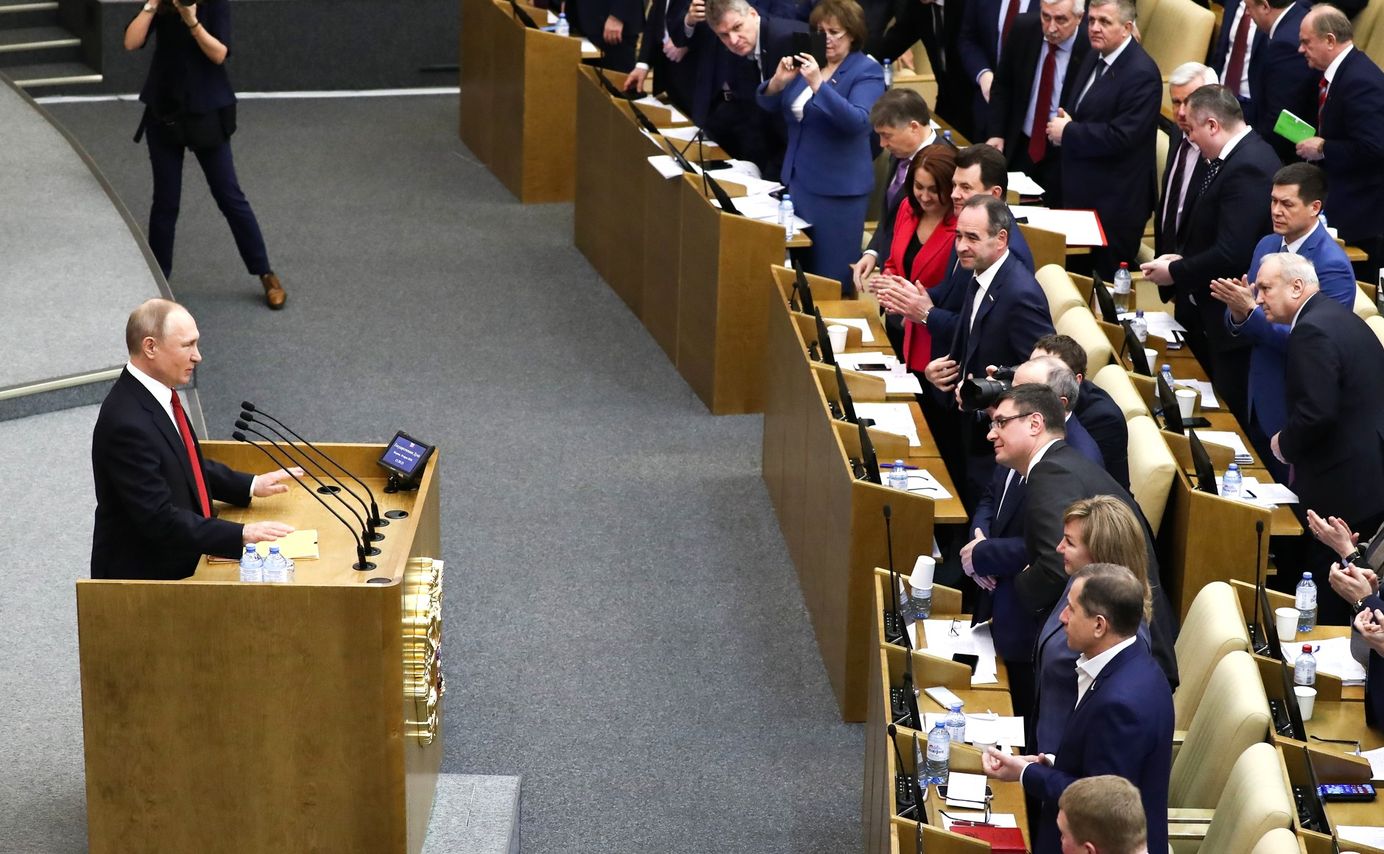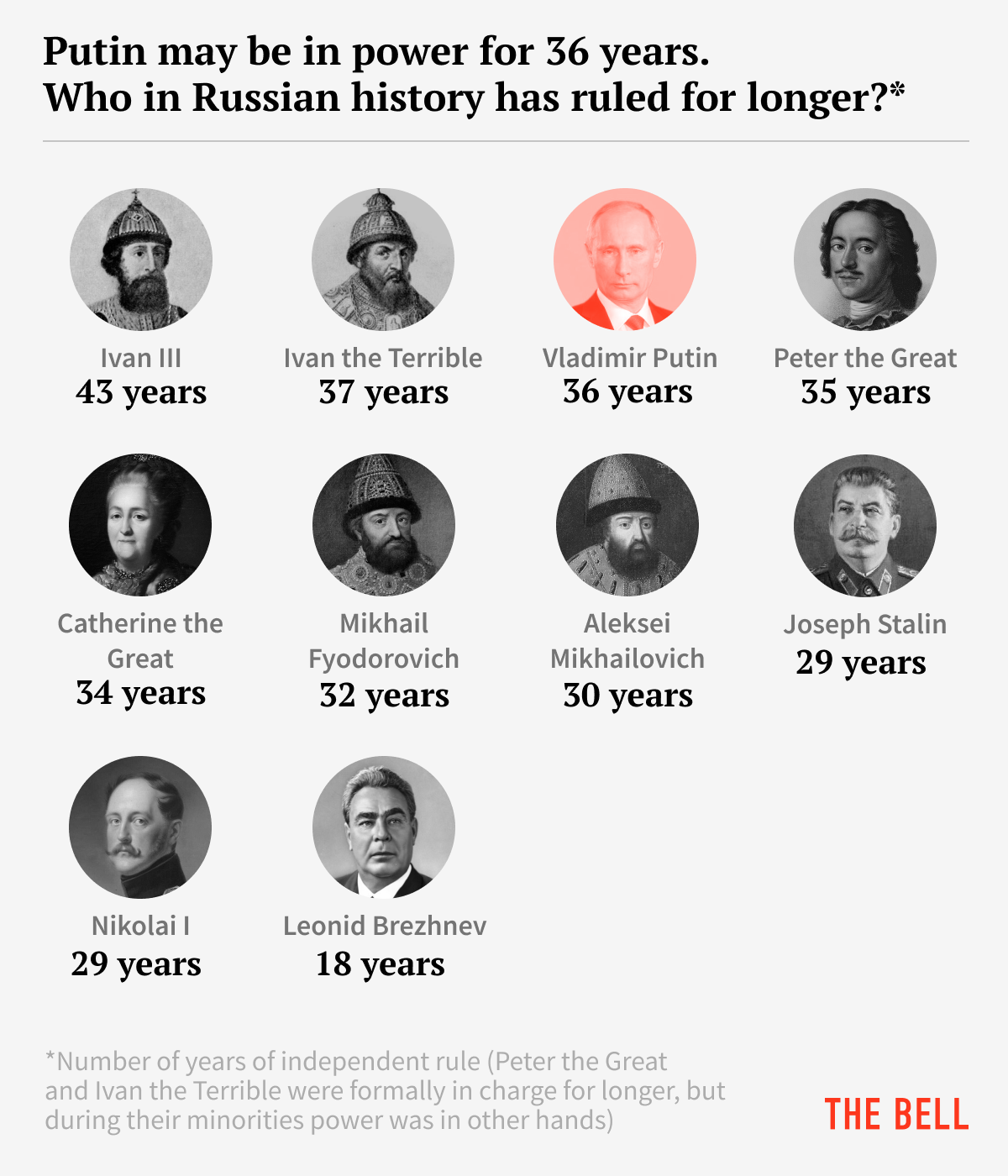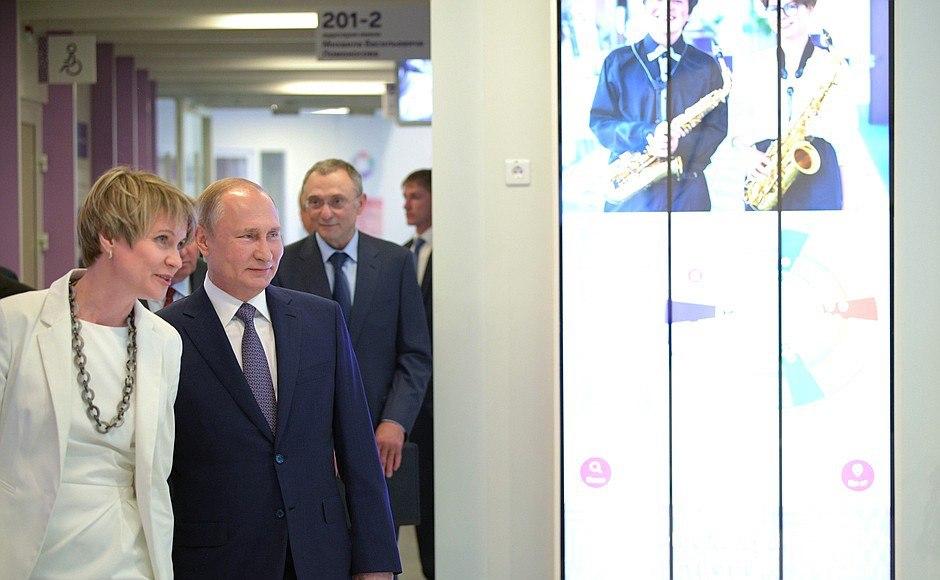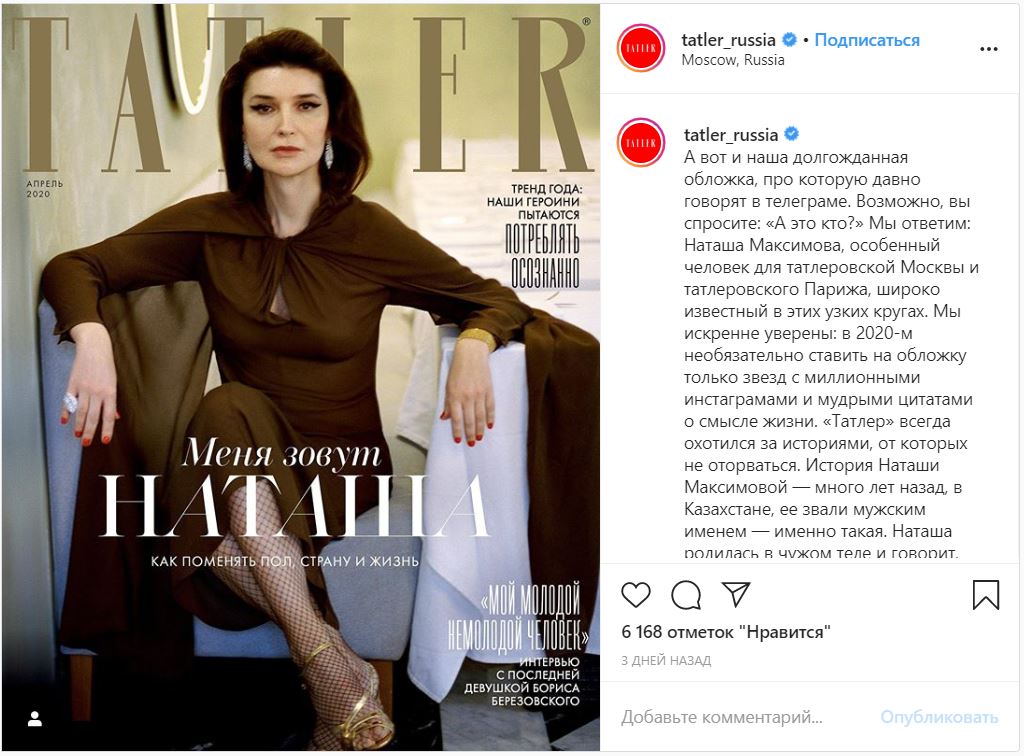
The eternal president
Hello! Before we get into what happened this week (spoiler: a lot), we’d like to take this opportunity to say a big thank you for subscribing to The Bell. We hope you value our newsletter. But in order to be able to continue what we do, we need your help. We’d like to ask you to take a moment to recommend The Bell to someone — a journalist, a researcher, a government employee, an executive, or simply family and friends. Or maybe write a post about us on social media to spread the word. To subscribe to The Bell, you just need to enter your email on this page. Thank you for your support!
Our main story this week is about Russia’s constitutional changes, which mean Putin could continue as president until 2036. We also look at why Russia decided to exit OPEC+ and whether the decision makes economic sense, the Putin links of an executive appointed head of Yandex’s Public Interest Foundation, and Tatler becoming the first glossy magazine in Russia to put a trans person on its front cover.

Constitutional changes mean Putin can rule through 2036
If you have glanced at the news from Russia this week, you will know that President Vladimir Putin approved changes Tuesday to Russia’s constitution allowing him to ‘reset’ his presidential term count and — at least in theory — remain president until 2036. In April, the new constitution will be put to a national referendum, the result of which is a foregone conclusion. Once it enters force, Putin is eligible to run for a fifth and sixth presidential term, which may mean he becomes Russia’s longest-serving leader in 450 years.

We won’t go in detail about how Putin chose to announce his decision, or the complex legal procedures for enacting constitutional changes — but we will highlight several important details, and attempt to answer some of the most pressing questions.
- Why? Putin said on multiple occasions he would not change the constitution to stay in power — so the Kremlin had to explain why he changed his mind. The outbreak of coronavirus was helpful here, as were crashing global markets. Putin’s press secretary Dmitry Peskov said Putin’s decision reflected “extreme turbulence in the world”, and anonymous Kremlin sources told media outlet Meduza that “nullifying” of presidential terms was put on the agenda when tensions with Turkey over Syria rose at the end of February. In 2011, when Putin decided to return to the presidency, replacing Dmitry Medvedev, the Kremlin didn’t give any official explanations. But sources in journalist Mikhail Zygar’s bestselling book later explained the decision in a similar way — a lack of confidence in Medvedev during the Libya conflict. Putin adviser Valentin Yumashev recently said (Rus) the same thing.
- The drama. In time-old autocratic tradition, a ruler shouldn’t announce such decisions himself — rather the people should ask it of him. As an appropriate mouthpiece for ‘the people’, the Kremlin selected State Duma deputy Valentina Tereshkova, the Soviet Union’s first female astronaut. She is not only well known, but has over 50 years of parliamentary experience (she became a deputy to the Supreme Soviet in 1966). By using such a person, the Kremlin was protecting itself from criticism. “Attacks on Tereshkova are attacks against our country,” Duma speaker Vyacheslav Volodin said Friday. In the same session, he also said, “Our competitive advantage is not oil and gas, it’s Vladimir Putin.”
- Smokescreen. The announcement that Putin’s presidential terms would be ‘reset’ was preceded by two months of discussion on constitutional reform. Constitutional changes include the addition of a reference to God, a reference to the Russian people being “state-forming”, marriage as a “union between a man and a woman”, and a reminder about the Soviet Union’s victory over Nazi Germany in the Second World War. All of this was the subject of public discussion, and many of the proposals came in for criticism. But with Putin’s announcement Tuesday it became clear that all of these debates were only a distraction from the most important change of all.
- Speed. We have pointed out many times that Putin likes carrying out political decisions like special operations. This time he outdid himself. The presidential term ‘reset’ was proposed by Tereshkova ahead of the second reading of the constitutional reform bill, the last moment when amendments can be submitted. Within 24 hours, the whole bill had been passed by the Duma and the Federation Council, and, 48 hours later, 75 regional parliaments out of 85 had also voted in favor (local governments must also approve constitutional changes). Now, the bill must be reviewed by the Constitutional Court, and, after that, Putin can announce a date for a referendum (likely to be April 22). The speed of the process deprived the opposition of an opportunity to organize protests, explained political scientist Tatiana Stanovaya.
How will Putin’s powers change?
With the Kremlin hinting that Putin would step down from the presidency, many were surprised by the contents of the constitutional reform, which boosts the — already enormous — authority of the Russian presidency. With the announcement this week, it all becomes much more understandable. These are the most important new presidential powers:
- The right to dismiss judges, including members of the Constitutional Court (with the approval of the Federation Council).
- The right to dissolve the State Duma if, in the process of forming a government, deputies do not approve the candidature of more than one-third of ministers.
- An extra legislative veto — ahead of signing laws, the president can send them for review to the Constitutional Court (which is totally under his control).
- A stipulation in the constitution that the president provides “overall leadership to the government”, and the prime minister must carry out the president’s orders.
Will there be protests?
All of the political experts contacted by The Bell were confident there will be no protests. Only about 2 percent of the population is prepared to take to the streets, according to Denis Volkov, a sociologist at independent pollster Levada Center. However, he said there could be protests ahead of the 2024 presidential election. “A significant number of people approve of Putin and recognize his service to the country, but far fewer see him as someone who can carry the country into the future,” he told The Bell. “When the real question of the next president arrives, the potential for protest may increase.”
Will Putin definitely run for election in 2024?
This is a big question — to which no-one knows the answer, likely not even Putin himself. But Putin’s behaviour is entirely in character: he likes to give himself the maximum number of possible options and leave a decision until the last moment. Currently, the Russian leader’s political position is not as solid as it might appear. His approval rating fell (Rus) to a historic low of 29 percent in February. By comparison, even at the peak of 2018 protests against the pension age increase, Putin’s approval rating didn’t go below 35 percent.
Political expert Konstantin Kalachev said Putin is highly unlikely to leave the presidency at a moment of economic and political decline — he will only depart during a period of positivity. “He isn’t holding onto power, but rather onto his place in history,” said Kalachev. “He is waiting for an opportunity… to be able to say: I built the foundations and I created the conditions for growth, now let someone else continue what I started.”
Does Russia’s reasoning for abandoning OPEC stand up?
The week following the breakdown in relations between Russia and OPEC was one of the worst weeks on record for both the Russian stock market, and the ruble. The main architect of Russia’s withdrawal from the so-called OPEC+ was Igor Sechin, the head of state-owned oil giant Rosneft and a close associate of Putin. Since then, Rosneft has sought publicly to explain how the Russian economy will benefit from an end to cooperation with OPEC. The Bell has looked at Rosneft’s arguments to see if any of them hold water.
Argument No. 1: Oil prices would have collapsed anyway because of the coronavirus outbreak, meaning that there was no better moment to exit the OPEC+ deal.
For: Coronavirus has unarguably put the oil market under pressure. The price of crude fell 27 percent from early January even before the end of OPEC+. Some economists, including Konstantin Sonin, believe the influence of OPEC+ on oil prices is greatly exaggerated.
Against: Leaving the deal may be the right strategic decision, but is a tactical error, according to economist Kirill Tremasov. It was self-defeating to take such a radical step with the financial markets already in a very vulnerable situation, he argued.
Argument No. 2: The U.S. benefited from the OPEC + deal, not Russia. Falling prices mean shale oil extraction in the U.S. will become loss-making, so production will be frozen.
For: Since Russia teamed up with OPEC in 2016 and agreed to cut production, the market share of U.S. shale oil producers really has grown. Between 2017 and 2018, BP data shows that the share of the world oil market belonging to Russia (12.1 percent) and Saudi Arabia (13 percent) was unchanged, while the U.S. share rose from 14.2 percent to 16.2 percent.
Against: Saudi Arabia has already announced it will increase its oil production by 2 million barrels per day (bpd). In comparison, Russia only has the capacity to ramp up production by 300,000 bpd in the short term, and by 500,000 bpd in the long term, according to Energy Minister Alexander Novak. There are doubts this is enough to replace U.S. shale oil on the world market. The U.S. government may also support its producers with tax discounts.
Argument No. 3: Russia’s energy revenues will increase in the future.
For: Russia’s Ministry of Energy expects the oil price will return to be about $45 a barrel in the second half of 2020. At the same time, Novak has confirmed that Russia is not discussing the possibility of a new deal with OPEC.
Against: Economists surveyed by The Bell believe oil prices could recover to $45 a barrel only if Russia returns to the negotiating table with OPEC. If not, they will remain at $30.
While the world should care
This week, the Russian economy moved from saving its energy revenue surplus, to spending it. The Ministry of Finance claims Russia’s reserves are enough for 10 years of low oil prices, but this ignores the costs of supporting an economy ravaged by coronavirus.
Putin election campaign chief given role in Yandex management
A former co-head of Putin’s 2018 presidential campaign, Yelena Shmeleva, has been appointed to head internet giant Yandex’s Public Interest Foundation, a body created last year as part of a deal with the Kremlin. The 11-member Foundation has management rights, and a veto over transactions involving over 10 percent of Yandex stock.

- The appointment of Shmeleva as director of the Public Interest Foundation was reported Wednesday by Russian media outlets, immediately sparking fears about Kremlin’s influence over Yandex. Not only did Shmeleva co-head Putin’s 2018 re-election campaign, but she is in charge of the Talent and Success Fund that manages one of Putin’s pet projects, the Sirius education centre. Sirius offers courses to gifted Russian students, and was thought up by Putin, who also proposed the name and personally interviewed Shmeleva for the job. One of the members of Talent and Success’ board of directors (chaired by Putin) is cellist Sergei Roldugin, allegedly a secret caretaker for the Russian leader’s private wealth. Putin regularly visits Sirius, which is located in the Black Sea resort town of Sochi.
- The Public Interest Foundation was set-up in November as part of an agreement between Yandex and Kremlin officials to give the state a greater say over the running of ‘Russia’s Google’. The deal came after months of pressure on the internet giant, including draft legislation that would have destroyed its shareholder structure by banning foreigners from owning more than 20 percent of Russian internet companies. The Foundation does not own Yandex shares, but has management functions and appoints two ‘super-directors’ to the company’s 12-seat board.
- The executive director of the Foundation is Yandex director Yelena Bunina, while the other 9 members include Yandex founder Arkady Volozh; Alexander Dyukov, chairman of the board of state-owned Gazprom Neft; Alexander Shokhin, head of the Russian Union of Industrialists and Entrepreneurs; and Andrei Sharonov, head of Skolkovo business school.
Why the world should care
Yandex’s agreement with the Kremlin over a new management structure was a pioneering compromise for the Russian internet market, but the appointment of Shmeleva is a worrying sign for the company’s independence. Investors will be watching closely to see how the Public Interest Foundation will exercise its powers.
Trans woman on glossy magazine cover for first time
The Russian edition of U.K. lifestyle magazine Tatler has become the first glossy magazine to put a trans woman on its front cover. The April edition of Tatler carried a long interview with socialite Natasha Maksimova, who grew up in the former Soviet republic of Kazakhstan and now splits her time between Moscow and Paris. The title of the interview was “My name is Natasha.” After coming out as trans last year, Maksimova said (Rus) being put on the front cover was “a step forward” and “proof that everything wasn’t in vain”. There is little public discussion of trans issues in Russia, and trans men and women face discrimination and violence. Tatler in Russia is owned by U.S. media company Condé Nast, which also publishes the Russian editions of magazines Vogue, GQ, AD and Glamour.






